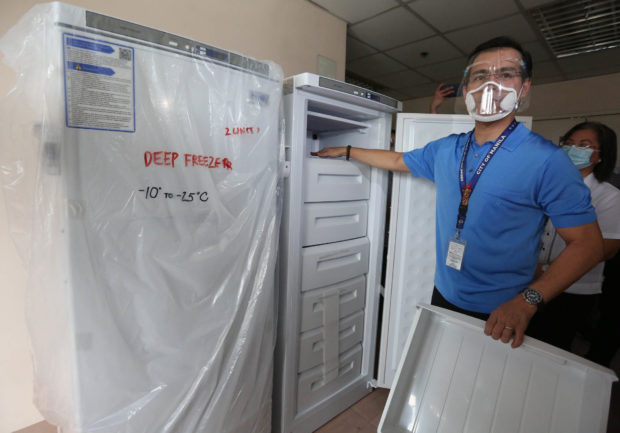
VACCINE STORAGE Manila Mayor Francisco “Isko Moreno” Domagoso shows the biomedical freezers to be used to store COVID-19 vaccines at the Santa Ana Hospital in Manila. —MARIANNE BERMUDEZ
The COVAX Facility will be conducting inspections in the country until Jan. 29 to ensure its readiness to receive COVID-19 vaccines.
Vaccine czar and national task force against COVID-19 chief implementer Carlito Galvez Jr said that the inspections began on Monday and would focus on the availability of cold storage facilities for the temperature-sensitive vaccines.“We have spoken to 80 owners of cold storage facilities for both agricultural and pharmaceutical products. We are preparing for the pharmaceutical (storage) because we can’t mix them with agricultural products,” he explained in a TV interview.
“So we are speaking with (pharmaceutical companies) and other companies with pharma-grade cold chain and they will submit reports immediately. These reports we will also submit to the COVAX Facility so that they will understand that we are more than prepared,” Galvez said.
According to him, once the country’s application to the COVAX Facility is approved, 20 percent of the Philippine population will get free COVID-19 vaccines produced by either Oxford University-AstraZeneca, Pfizer-BioNTech, Janssen, Johnson & Johnson, or Novavax.
The COVAX Facility is a global platform organized by Gavi Alliance, World Health Organization and the Coalition for Epidemic Preparedness Innovation. It negotiates pricing for COVID-19 vaccines and ensures equitable access for participating countries.
In San Juan, city officials have begun talks with cold chain storage companies after the national government announced that Pfizer vaccines might be distributed to local governments, on top of the 100,000 doses the city bought from AstraZeneca earlier this month.
Pfizer is among the vaccines with a high efficacy rate at over 90 percent but it needs to be stored at -70 degrees Celsius.
San Juan currently has storage facilities that can only go to as low as 2 to 8 degrees Celsius, the storage temperature required by AstraZeneca vaccines.
“It is not practical for San Juan to build our own [cold storage facility for Pfizer vaccines] because we only have a small population,” Mayor Francis Zamora said in a phone interview.
The facilities will be mobile in nature, Zamora explained, since the city may be conducting its COVID-19 vaccination program in barangay halls and health centers, covered courts and other government-owned buildings.
The City of Manila, on the other hand, has acquired 12 refrigeration units and 50 transport coolers for its vaccines.
Three are from Pfizer which can accommodate a total of 2,877 liters; four are from Moderna and Johnson & Johnson which can store 2,160 liters while five are from Novavax and Sinovac good for 1,950 liters.
“We bought all types of freezer for all types of vaccines. We will have -80 which will come anytime from now from Pfizer, we have -10, -25, positive 8 and positive 2 refrigeration systems to represent the existing vaccine,” Mayor Francisco “Isko Moreno” Domagoso said.
He inspected on Monday the 130-sq-m refrigeration system at Sta Ana Hospital which was currently undergoing renovation — part of the city’s investment because it could also be utilized for other vaccines after the pandemic, according to him.
Taguig City will use the 6,500-sqm facility of Orca Cold Chain Solutions in Barangay Bagumbayan to store its Covid-19 vaccines. — With reports from Meg Adonis and Jodee A. Agoncillo